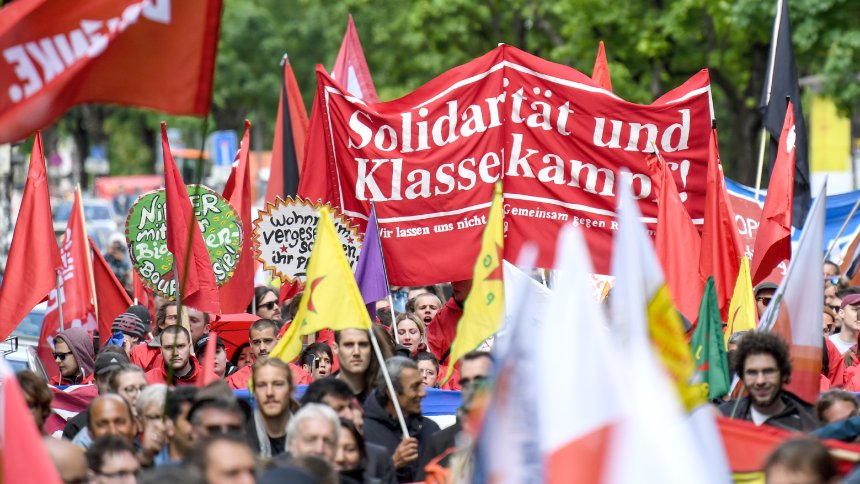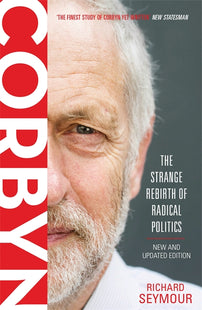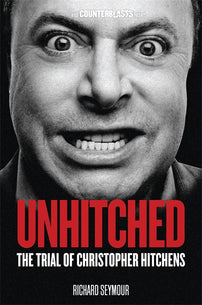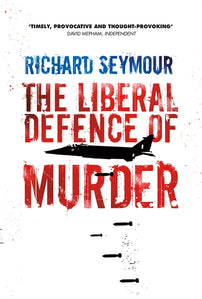Reinventing the anti-immigrant wheel
What would a renewal of social democracy in Germany mean, and at what price? In this article, Richard Seymour questions the platform and strategy of the new left coalition Aufstehen headed by Sahra Wagenknecht and Oskar Lafontaine.

I.
The new German left coalition, Aufstehen, aims to break the morbid consensus of perpetual ‘grand coalition’. Unsurprisingly Wolfgang Streeck, one of the few sociologists who would think to ask the question How Will Capitalism End?, is one of its partisans. A long-time supporter of Die Linke, he sees in the emerging coalition the chance to realign the left on the basis of an orientation to power.
If the ‘realists’ of Die Linke coalesce with the left-wing of social democracy, they could legitimately aim to govern. They could break the deflationary fiscal regime, end the taboo on taxing corporations and the rich, end debt rules that prevent municipalities from writing off their debts and the government from credit-financing infrastructure, address class and regional inequalities, and abandon a decrepit US-aligned foreign policy of propping up some corrupt governments and bombing others. This is an agenda that most on the Left would support.
So why is there a need for a new coalition? Die Linke is surely the one German party that has consistently supported policies like this. What would yet another realignment achieve beyond a further step down the road to a fractal Left? What, given the ambition of Streeck’s agenda, is there to be ‘realists’ about? What is the issue over which there is such “moralising away of fundamental questions” that one needs a new Left?
The issue, at least for the ‘realists’, is immigration. Specifically, it is Die Linke’s commitment to open borders, and its repudiation of former leader Sahra Wagenknecht for dabbling in anti-refugee rhetoric. The ‘realists’ are the Wagenknecht wing, the ‘sectarians’ are the delegates who voted against her. Unable to win the argument in Die Linke, the ‘realists’ are launching a new political vehicle. This is the aspect of Streeck’s case that I want to comment on. Or rather, because he submerges the argument in the general rhetorical sweep of his Frankfurter Allgemeine Zeitung article, this is the part I want to expand on.
II.
One has to admire, first of all, the parsimony of Streeck’s political taxonomy. As far as arguments on the Left go, there is only one fork in the tree of possibilities. On one branch, we find ‘realists’, accommodating the anti-immigrant sentiment which the Alternative for Germany (AfD) capitalises on. On the other, ‘sectarians’, sacrificing political efficacy to moral posturing, and using the AfD’s far right politics to avoid the issues they raise.
If these sound like the sorts of one-dimensional protagonists one might encounter in a morality fable, they are. Nonetheless, Streeck says, the prevalence of preening sectarians means that the “big questions” are suppressed. Capitalism, democracy, climate, war, “globalism” and “national statehood” are off the agenda while purists ineffectually worry about the “niceties of national and international asylum law”.
From this, one might get the impression that the ‘realists’, led by Aufstehen founder Sahra Wagenknecht, are desperately keen to stop talking about refugees. Yet one thing that one really can’t say about them is that they’ve driven refugees down the political agenda. It may not be the issue they spend most time talking about, but it is the issue that defines them as distinct from their opponents on the Left. Granted that they do, in fact, also talk about war, climate, inequality and capitalism, that wasn’t ever controversial in Die Linke.
Indeed, it was Wagenknecht who chose to make refugees the issue, in a deliberate and predictably controversial break with Die Linke’s policy, by attacking Angela Merkel from the right, beginning in August 2015. Merkel had, in response to a popular sentiment in favour of letting in Syrian refugees, undertook a short-lived pirouette to Wilkommenskultur. The Dublin Regulation, an EU law which says that member-states have to process applications from asylum seekers, was suspended. The purpose of the law is to ensure that migrants who arrive in destinations like Greece, Italy and Spain, stay there. It is linked to an apparatus designed to deter refugees from making the journey to Europe, from illegal ‘pushback’ agreements with Greece and Turkey to the harassment of rickety boats on the Mediterranean seas by Frontex operations. But Germany, for a brief moment, said it would welcome the refugees.
III.
One would be entitled to be a little cynical of Merkel. Though often mistaken for some sort of bleeding-heart liberal, she had cheerfully baited migrants and Muslims, and declared multiculturalism a failure, and bears significant responsibility for the fortification of ‘Fortress Europe’. But when Wagenknecht attacked her, it was for suggesting that Germany could handle the refugee inflow. She later blamed Merkel’s “uncontrolled border opening” and police cuts for causing a major attack carried out by an ISIS supported in Berlin in December 2016.
Nor was Wagenknecht, in making this claim, weighing in with an argument that was under-represented in the political spectrum. The giddy thrill of transgression that palpably comes with such ostensibly hard-headed ‘realism’ is entirely unwarranted. Her argument that open borders was to blame echoed the AfD. The complaint about police budget cuts echoed the social-democratic vice-chancellor, Sigmar Gabriel. More broadly, in attacking the momentarily liberal-sounding Merkel from the right, Wagenknecht was cutting with the grain of established government policy and rhetoric. There are, further, many ways to describe what such rhetoric does. For example it, demagogically, leverages the emotional response to a devastating event to advance a political argument. But one thing it definitely doesn’t do is break the mould, forcing the long-neglected issues of capitalism, democracy, climate and war back on the agenda.
Still, what if the argument was correct? Shouldn’t that be the most important thing? Should political correctness censor the truth? What could be more typical of the moral Left than its fidelity to abstractions over mucky realities? Anis Amri, the Berlin killer, was after all an asylum seeker from Tunisia: QED. I will not evade this, but I will just briefly pause to point out what might not be obvious, viz. that majority of terror attacks in Europe continue to be carried out by citizens of Europe, not migrants, and that the UN’s study could find no evidence of any correlation between migration and terror. So there is already a problem with conflating border controls with counterterrorism.
That said, Anis Amri was definitely not the beneficiary of any “uncontrolled border opening”. Amri had arrived in the Italian island of Lampedusa by boat in 2011, like tens of thousands of other migrants fleeing the turbulence of the Arab spring. He was held in a detention camp for refugees. Why is there a detention camp for refugees in Lampedusa? I’ll come back to that. When thousands of the detainees rioted, in protest against the notoriously awful conditions – which the island’s mayor compared to a concentration camp – he was among those locked up for it.
It was in a European jail that Amri was spotted and recruited by the jihadists who would link him to ISIS. He was already in the Schengen Zone when he migrated to Germany in July 2015, shortly after his release but before Merkel’s announcement. And while he did apply for asylum, he was turned down and scheduled for deportation – like most asylum applicants in Germany. While the deportation was going through the courts, he was under surveillance by German security services. They determined that he didn’t pose a threat. They were wrong, of course. But neither in the detail nor in the big picture does the Amri case prove anything about Merkel’s suspension of the Dublin Regulation, let alone that Germany is a soft touch and that refugee controls are too lax.
IV.
So, far from thinking asylum is a marginal issue, or a distraction, Wagenknecht and allies clearly think it an issue worth fighting over. One for which they are prepared, at key moments, to say things that are emotive, grossly inaccurate, and just a little bit sleazy.
It is clear enough what Wagenknecht was trying to do, and what the ‘realists’ in Aufstehen are now trying to do. Die Linke had been suffering from a prolonged political stalemate. Far from gaining amid capitalist crisis and eurozone turmoil, it had seen its vote stagnate since making a small gain in the 2009 Federal elections. In 2017, it was beaten into fifth place by the FDP and the AfD. The Left Party lost eleven percent of its voters to the AfD between 2013 and 2017, although a far bigger share of far right votes came from the CDU/CSU, and more still were previous non-voters.
Wagenknecht and her allies think this is because Die Linke is out of touch with its ‘traditional’ supporters. The older, less educated manual workers in the East who voted AfD are not reached by squeaky-clean, sanctimonious middle-class activists crying about dead refugees. The rage against refugees, they think, reflects a misdirected class anger on the part of the poor. This poor man’s economism patronises people. It treats them as victims of an astonishingly crude form of ‘false consciousness’, taking no account of the elaborate systems of perception and values in which such beliefs are grounded. Not to mention the sheer stubborn, cussed delight with which people invest their beliefs. It doesn’t ask what it might mean, in terms of their attachment to hierarchies and competition, if people are more offended by refugees than by class injustice.
Yet it is not just an argument about false consciousness. Rather than alienating those who vote for the AfD, the ‘realists’ proceed, the Left needs to understand and address their legitimate concerns, then give them a radical gloss. In an article written with playwright Bernd Stegemann for Die Zeit, Wagenknecht rebukes the Left for feel-good purity, oblivious to the fact that refugees compete for “scarce resources at the bottom of society” and can be a little bit scary and strange at times. Notice that Wagenknecht and Stegemann aren’t, themselves, claiming to be affrighted by refugees with their strange ways. I suspect they would be mortified to confess to such a disposition. For that reason, the attempt confer a certain rationality and grown-up dignity on an everyday prejudice reeks of condescension and bad faith.
It is also, finally, illogical. There is no evidence that the anti-refugee position is driven by any practical experience of competition or brushes with any frightening foreign culture. To the contrary, the AfD vote in 2017 was highest in the areas with the lowest share of foreign-born population: an utterly typical pattern. By that time, moreover, Wagenknecht’s rhetoric had been prominently broadcast across all media for two years. If it was going to woo those racist voters, one might have expected it to do so by then. Instead, it may well have given some voters the motivation they needed to jump ship.
V.
As Aufstehen was launched, Wagenknecht and Stegemann co-wrote another article for the Nordwest-Zeitung, calling for a “realistic” immigration policy, steering a convivially middling course between two unpalatable extremes: “the resentment of the AfD” and “a limitless welcome culture”. Such a policy would fund those volunteers looking after refugees, without allowing people smugglers “to dictate which people can reach Europe by illegal means”. This is a soothing formulation. Realism. Who wants to be unrealistic? Smugglers. Who wants to be on their side? Neither this extreme nor that extreme. Who doesn’t want nuance?
The ‘realists’ are in no way breaking new ground with such rhetoric, so familiar from centrist triangulation. It is not as exciting as blaming open borders for terrorism, but it is utterly conventional for the politicians who empower traffickers by criminalising refugees, to then blame the traffickers. And even, when the predictable casualties wash up in their dozens, even their hundreds, on an Italian beach, threaten to bomb them. Yet, in a world where transport is becoming ever cheaper, what is it that gives exploitation-mongers such leverage? Why, to put it more concretely, has there been a spike of drownings in the Mediterranean in recent years, as those rickety boats run by the traffickers sink?
The number one reason, according to the UN’s International Organization for Migration (IOM), is the ramping up of European border controls, including strategies of “illegal pushback” by land. These strategies have been formalised by Merkel in deals with both Turkey and Greece. Deals which have been faulted for violating Article 4 of the European Convention on Human Rights, outlawing the collective expulsion of aliens.
These policies didn’t follow a huge influx of refugees. The flow of irregular migrants, only a minority of whom were refugees, had fallen sharply in the 2000s. The share of irregular migrants as a proportion of the population has varied from 0.38 to 0.77% of the total European population. There was a short-lived spike in 2015, driven by the Syrian civil war: with one million arriving by sea alone, according to data kept by the IOM. In 2016, it fell to 387,985 by land and sea. In 2017, the figure was 176,452. In a continent of 741.4 million, with over five million born each year, and even assuming that every single new arrival was accepted and then contributed nothing by way of work and taxes, this is simply not the crisis-inducing burden that Wagenknecht has claimed.
It is always a risk to play the numbers game. For a lot of people, any number is too high when it’s refugees and immigrants. They have been defined in advance as a problem, by newspapers, politicians and policies intended to demonise them. To downplay the number of refugees implies that it’s just as well there are fewer, because ‘they’ are indeed a problem. Worse, this tends to have a retroactive effect. If new migrants, refugees or not, are defined as a problem and a burden, then it follows that they must always have been a problem and a burden. Therefore today’s citizens, whose parents and grandparents arrived as migrants, are always potentially a problem and a burden. But, it is useful to underline just how separated from reality anti-asylum rhetoric has become.
The logical position, if you’re anti-trafficker, is to wind down the panic, and roll back the policies known as ‘Fortress Europe’. Rather than spending €25bn over six years to expand the EU borders apparatus, let more refugees in and let them build new lives. And, to her credit, Wagenknecht has in the past voted against asylum restrictions, and called for such invidious measures as the Dublin Regulation to be permanently cancelled. Yet, that increasingly is not the tenor of her rhetoric around immigration. And nor, in view of the publicity around Austehen, will it be the tenor of the new organisation.
VI.
It would be convenient to dismiss this as mere political opportunism. And, in part, it is: to give up difficult strategic terrain for short-term, tactical gains, is the essence of opportunism.
Nationalism and anti-immigrant racism have long been major pull factors drawing millions to the Right. The centre-left traditionally attempts to neutralise it, electorally, by appropriating it. Shortly before losing the federal election in 2005, Schroeder unavailingly mimicked Merkel’s attack on multiculturalism, worrying that immigrants were failing to integrate, creating “lawless zones or parallel societies”. Their coalition partners, the Greens, joined in: “integration is no game”, they said, abjuring multiculturalism “if it means that anyone can do whatever they want”.
This was not a response to a real situation. Multiculturalism had never meant anyone doing “whatever they want”. Germany was not dotted with “lawless zones”. But the SPD and Greens believed that others believed in this fantasy, and it was easier to attempt to ventriloquise them than abandon their hardline neoliberal reform agenda. It is difficult not to see an echo of this in the Wagenknecht strategy, from demagoguery about terrorism to middle-steering, difference-splitting rhetoric about the AfD. But, even in cynical, electoral realpolitik terms, it doesn’t work. It never works. It merely sustains the emotional basis for racism, what Spinoza called the ‘sad passions’. And those who want immigration-bashing can usually smell a bullshitter and will vote for the real Armani. If the radical-left doesn’t defend immigrants and challenge the racism driving the AfD vote, even at the cost of offending the sensibilities of potential voters, no one else will. And the beneficiaries will be the Right.
It is not just opportunism, however. This is where Streeck’s piece does usefully clarify the stakes. In his sophisticated analyses of capitalism’s modes of crisis management, and the brick wall it hit in 2008, Streeck has repeatedly asserted the legitimacy of the national state against globalisation. If capitalism is to be subordinated once more to democratic control, the key strategic locus for that control is the nation-state, which is not just a material fact but a legitimate civic and political community. In this he opposes the necessarily rooted nationality of democratic citizenship to the cosmopolitanism of investors and bankers.
For Streeck, as for Lafontaine, Bernie Sanders, and many others on the social-democratic Left, immigration controls are essential for any viable left-wing government. If you have open borders, Streeck warns, it is harder to regulate labour markets and suppress wage inequality. You can’t take account of what infrastructural capacity there is to support migration. A “pragmatic” policy would dispense with such abstractions and determine socially-just criteria for admissions and exclusions. Points systems, for example, as well as means to keep out undesirables. Given, moreover, that Streeck accepts the nation-state as the only viable locus of social solidarity and democracy, open borders is morally unacceptable. Hence, he worries about fellow citizens – AfD voters, one presumes – being declared “Nazis and racists” because they don’t want the collective goods they have financed through taxation “to be declared morally liable to being expropriated”. It is not clear whom the expropriators are supposed to be here, if not migrants.
Of course, believing all of this need not lead one to engage in the kinds of public baiting that some of the ‘realists’ have. One could believe every word of the above and still think that there should be fewer and less restrictive border controls than there currently are. One could, as Streeck does, flatly dismiss the open borders position, airily dismissing it much as one might dismiss the case for flying saucers, without thinking that one can somehow bait-and-switch racist voters. There are as many varieties of ‘realism’ as there are ‘sectarianism’.
VII.
Yet, the fact that in the case of the ‘realists’ he lauds, it does lead to demagogic baiting – and soft-peddling the argument with the AfD, and vague genuflections to the ‘issues’ they raise – is grounds for questioning it.
Is it really plausible to oppose nation to capital in the way that Streeck and so many other social-democrats do? How ‘cosmopolitan’, really, are investors and bankers? Are they not wholly dependent on nation-states to furnish them with stable currency and infrastructures and advance the global institutions which entrench property rights, investor rights and capital mobility? Are they not largely integrated into their respective national states? Has the strength of the nation-state really waned, or is it more the case that the position within nation-states of subaltern groups, and their democratic self-expression, has waned? Is the Left’s task to re-empower national states and to rally round the civic communities subtending them, or to shift the balance of power within them?
On the question of migration, it is not clear that what Streeck adumbrates by way of strengthening the nation-state’s role is in any sense inconvenient to capital. In what way would a points system, for instance, not subordinate labour mobility to the interests of capital, and further entrench labour market segregation? In what way is it better for workers that states assume more right to restrict their mobility in the coming years? Presumably the idea is to use tighter borders to create tighter labour markets and support wage claims supposedly threatened by competition from migrant labour.
This is known as the “lump of labour fallacy”, neglecting as it does the fact that migration tends to increase total employment, rather than raise competition for existing employment. Even in the Schengen Area, where the ‘pull factors’ are shaped by institutionalised precarity, weak unions and emaciated welfare, there is little evidence of such effects in the aggregate. Even having a points system in place, however, doesn’t stop migrants from being blamed for low wages, despite the paucity of evidence. To put it bluntly, whatever immigration regime you have, there will always be people falsely blaming social problems on immigration. Not because it’s the fault of immigration but because some people are xenophobic or racist. Why should the Left give ground to this?
Finally, is the nation-state really the exclusive plausible basis of democracy and social solidarity, as Streeck suggests in his debate with Adam Tooze? The Left didn’t always think so. Much of its history has been characterised by social movements and alliances which deliberately practiced democracy and solidarity on scales other than the nation. This is a matter of taste, no doubt. But I prefer the Left that is uncompromisingly in solidarity with migrants and refugees, recognising them as class brothers and sisters, to the Left that will throw them under the bus for the mirage of “political power and responsibility”.
[book-strip index="1" style="display"]



